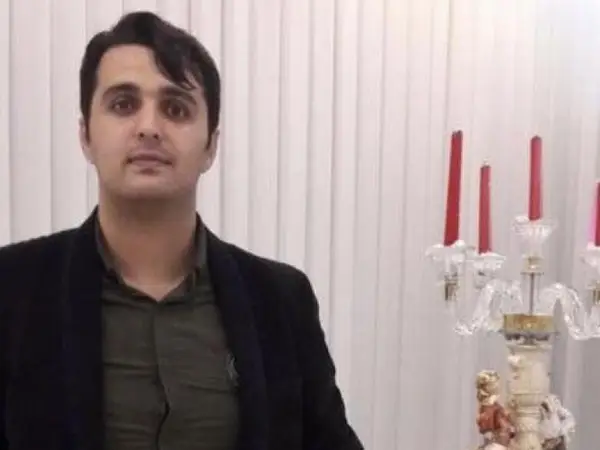Angered by the death of imprisoned protester Javad Rouhi, Iranians are demanding action as international rights groups urge probe into his tragic passing.
Activists and dissidents are gripped by profound shock and grief as news of the death in custody of one of the icons of Iran's current protest movement reverberates.
While human rights organizations have stressed the urgent need for a United Nations investigation and international action to hold the Islamic Republic regime accountable, activists demand a declaration of public mourning and launching nationwide protests in his name.
The Women, Life, Freedom movement began last September when 22-year-old Iranian-Kurdish woman Mahsa Amini was killed in the custody of the hijab police. Now with her death anniversary just two weeks away, the passing of the 35-year-old protester from the northern city of Amol, after months of reported torture and physical abuse, has reinvigorated regime critics.
Rouhi was incarcerated in Nowshahr prison in Mazandaran province and had been given a triple death sentence over unsubstantiated allegations of leading the protests in his hometown and burning a copy of Quran, which he denied. The only video of Rouhi on the night of his arrest shows him dancing in the circle of the crowd.
The Supreme Court overturned his death sentence, and he was put in “temporary detention” awaiting re-sentencing. Amnesty International reported in January of severe physical and psychological abuse during Rouhi's detention, a major part of which was solitary confinement.
On Thursday, the right group said the death in custody of “the arbitrarily detained protester exposes the Iranian authorities’ abhorrent assault on the right to life amid an ongoing human rights crisis and must be effectively and independently investigated.”
Amnesty International has documented at least 72 questionable deaths in Iranian prisons since January 2010. In 46 of these cases, informed sources said the deaths resulted from torture or other ill-treatment by intelligence and security agents or prison officials. Regime authorities have persistently refused to conduct transparent investigations, nor have they held any official accountable.
The United Nations Principles on the Effective Prevention and Investigation of Extra-Legal, Arbitrary, and Summary Executions mandates “thorough, prompt and impartial investigation” of all suspicious deaths in custody to “determine the cause, manner and time of death, the person responsible, and any pattern or practice which may have brought about that death.”
Official reports say that he had a seizure at 3:45am on Thursday and was urgently transferred to hospital, where he was pronounced dead. Tasnim News Agency, affiliated with the IRGC, reported that a judicial order had been issued to inspect the prison's CCTV cameras, document the deceased's personal belongings including notes and medications, and conduct a post-mortem examination and toxicology tests to ascertain the cause of death.
Human Rights Watch quoted an informed source as saying that security forces have pressured the family to arrange a private burial.
“The Iranian prison authorities’ egregious record of torture and mistreatment makes Javad Rouhi’s death in custody more than a little suspicious,” said Tara Sepehri Far, senior Iran researcher at Human Rights Watch. “An international inquiry is needed since there’s no reason to believe Iranian authorities will carry out a transparent investigation.”
The rights watchdog urged the Independent International Fact-Finding Mission on the Islamic Republic of Iran -- which the UN Human Rights Council established in September 2022 -- to investigate Rouhi’s death in custody. “The United Nations fact finding mission should investigate all torture and deaths in custody related to the protests in Iran,” Sepehri Far said. “Sadly, the case of Javad Rouhi is just the latest one.”
Iran Human Rights (IHRNGO) seconded the call on the UN Fact-Finding Mission to probe Rouhi’s death. IHRNGO Director Mahmood Amiry-Moghaddam said, “Javad Rouhi’s death must be investigated as an extrajudicial killing in prison by the UN Fact-Finding Mission. Ali Khamenei and all individuals and organizations involved in his arrest, torture and detention are responsible for his death and must be held accountable.”
Activist and journalist Masih Alinejad said on her Instagram page, "Let's make Javad Rouhi's name a symbol of our revolution. They killed Javad Rouhi too. They had sentenced him to execution, but they executed him secretly to minimize the costs for the Islamic Republic. Let's not allow them to succeed."
Nazanin Boniadi, another opposition activist, said, "Javad Rouhi's relentless resistance reflects the enduring spirit of the Iranian people's great revolution. Neither the horrendous tortures nor the ludicrous execution orders could stop him."
Siamak Montazeri, a former political prisoner, said in a video message, "Today, this ruthless and criminal regime has taken Javad Rouhi's life in the same dirty way they killed Mahsa Amini," calling for public mourning and urging people to take to the streets to protest against “this blatant crime and government-sponsored murder."
